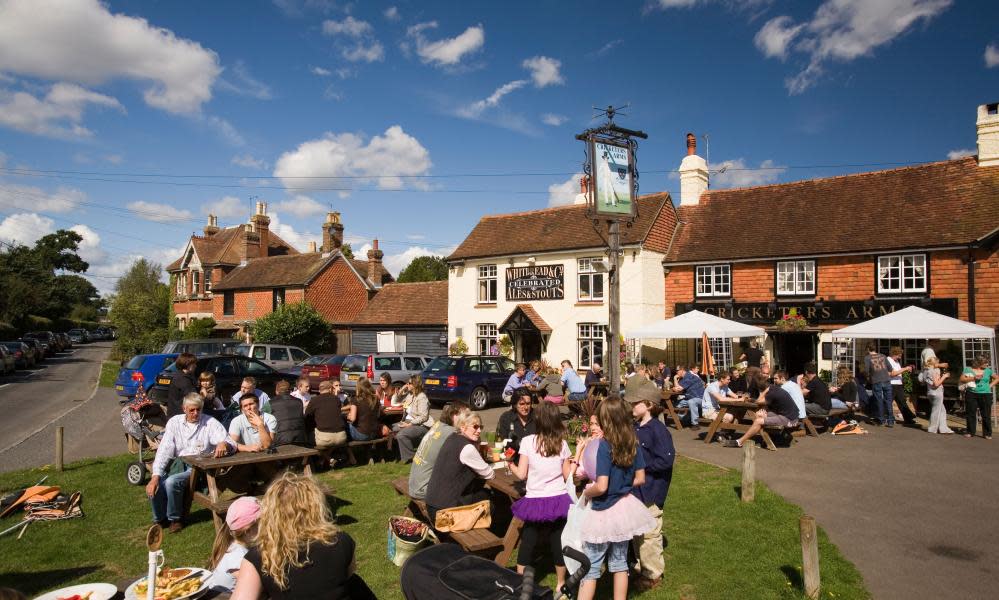Pubs are part of Britain’s fabric. Why are they not being properly helped?

I wish I was in the pub. I wish I was writing this at a wonky table, imprinting it with sticky rings each time I take a sip of my pint, a muddy dog curled at my feet.
I’m not alone. Of all the sacrifices and hardships we endure through successive lockdowns, propping up the bar may not be the most painful loss, but it’s keenly felt. A survey at the height of the first lockdown into what people in Britain were missing most showed that a visit to a pub or restaurant was second only to seeing family or friends. Given how many of us see family and friends in the pub, maybe we can adjust the figures and call it a tie.
The worry is that, the longer the pandemic drags on, the more likely this particular loss may be permanent. In November, nearly three-quarters of pubs feared closing for good if they were not given more government help. With smaller, independent pubs being hit harder than large chains and groups, the vultures are circling: this week, Wetherspoons and former Greene King CEO Rooney Anand each announced plans to buy up pubs that, in the words of the former, “are likely to be available at favourable prices, as a result of the pandemic”.
It looks increasingly likely that they’ll have their pick. Christmas, which can account for a quarter of annual profits, didn’t happen. May is now the likely reopening date for any pubs that survive until then. The government’s promised grant of £1,000 for every pub doesn’t go far when a closed pub costs its owners an average £800 a week, according to estimates made by industry insiders – particularly while 75% of smaller, “wet-led” pubs are still waiting to receive it. Last summer, while Rishi Sunak’s “eat out to help out” scheme benefited larger food-led pubs, wet-led community pubs saw no benefit whatsoever.
Lack of help is hard enough to deal with. Being unfairly scapegoated for the spread of Covid is even worse.
Back in March, in the first lockdown, pubs were forced to close before any other businesses. When they reopened in July, many commentators across the media predicted a wave of drunks creating nationwide super-spreader events. This never materialised.
And yet, pubs were subjected to stricter controls than any other business. At the same time as we were being told that it was our national duty to shop at chains such as Pret a Manger and Costa, pubs required you to sign in or register with the test-and-trace app before you could enter. Social distancing and mask-wearing were enforced far more rigorously in many pubs than in shops or on public transport. With the extra costs and diminished income from being limited to table service and 10pm curfews, by the time pubs were finally closed again in November, a third had already shut their doors because they couldn’t operate profitably.
Some in the industry suspect Covid is being used covertly by neo-prohibitionists to permanently remove the pub from its central role in British life. If this were true, it’s hard to imagine what the government would have done differently.
As with any conspiracy theory, the more likely answer is lazy incompetence and indifference. As the government’s farcical inability to decide on what constitutes “a substantial meal” in the autumn demonstrates, there was no real policy here beyond “look tough on pubs”, and no coherent rationale to support that policy.
Pubs proved an easy target then. In a nation that’s hung-up about its work ethic, time spent in the pub is seen as not worthwhile, even by many who frequent them. Many accept restrictions more easily on things we feel we probably shouldn’t be doing anyway.
Related: Britain's pubs: we'll soon see the value of them, but will it be too late? | John Harris
But the pub is more than just a place to skive or loaf. George Orwell cited the pub as an example of “all the culture that is most truly native”, the informal, unofficial liberty “to choose your own amusements instead of having them chosen for you from above”. Sure, pubs employ 350,000 people, contribute billions to the economy, and are a hugely popular tourist attraction, among many other things. But more importantly, they are the glue that binds our communities together and the expression of our informal cultural identity. There are hundreds of pubs called the Red Lion in the UK, but they’re not a chain. Most are independently owned, each one an expression of the publican’s personality. This is their charm. Perhaps – to people more comfortable with large corporations – it’s also their problem.
There is hope if you pick through the despair. It’s not just big investors who are looking to acquire pubs – people who know the business can see it has a future. Some historians tell us optimistically to expect a repeat of the roaring 20s once the pandemic is finally defeated, and maybe the town-centre “revellers” the tabloids love so much will re-emerge.
But after spending an eternity in our homes, I’m sure that when we can see family and friends again, we’ll be keen to do it somewhere else, and with something a little more celebratory than a weak coffee in a paper cup.
Pete Brown is chair of the British Guild of Beer Writers

 Yahoo Movies
Yahoo Movies 
